Safe Islands … for now
The United Nations has 193 members. 175 of these countries have confirmed cases of the Coronavirus. This leaves 18 countries — plus a few territories and dependencies — which are not yet infected with Covid-19.

These 18 uninfected countries include 20 or so Pacific islands. These islands are small and isolated. They have few mineral resources. The islanders survive on a little bit of tourism and what their children send back from jobs overseas. The Solomon Islands is the most populous with 650,000 residents. Only 1,620 live in Niue. In all, there are almost 2 million people living on these virus-free islands.
In February, when the first news of Covid-19 was reported, these islands imposed severe travel restrictions. By closing their doors to international travelers, they prevented the arrival of Covid-19. I was the last tourist allowed to deplane in Kosrae. After that, United Airlines cut its island-hopper service, This week, I received the following Level 4 Travel Advisory from the US Embassy:
U.S. citizens who live in the United States should arrange for immediate return, unless they are prepared to remain abroad for an indefinite period. U.S. citizens who are considering returning to the United States should work with United Airlines to make travel arrangements while flights are still available. There is an April 13 flight with seats available. The U.S. government’s ability to arrange dedicated repatriation flights is not sustainable indefinitely.
Once again, I must choose between staying in Kosrae or leaving. I’ve followed the news about the shutdown in the US. Friends and family have emailed stories about sheltering at home. I’ve reviewed every country’s travel restrictions. My traveling days are over — at least for a while. I emailed the US Embassy that I’m going to stay.
With no Covid-19, life in Kosrae is somewhat normal. This week was Kosrae’s annual Cultural Festival, an event with a parade that shows off local traditions and culture. About a quarter of the island’s residents turned out to say hi to each other, see one another’s growing children, exchange fruits for fish, and show off their new pickup trucks.

The parade was held in front of the high school gymnasium. The pickup trucks were decorated with flowers, bananas, fish and coconuts. Children and their parents waved and threw flowers, bananas and fish to the spectators. (It’s bad enough to be hit by a fish. I’m glad they weren’t throwing coconuts!) After the parade, whatever was left was bartered or sold. I was sorry to see a Green turtle hanging on the fishmonger’s truck. There was also music, free soup and drinks.
To stay busy and to make myself useful, I volunteer at the high school. Last week, I took the junior class on a field trip to Wiya Bird Cave. Here they learned how this lava tube was formed and all about the Swiftlets that live here.
Other field trips have included visits to the last Ka (Terminalia carolinensis) Forest in the world and some of the remnants of Japan’s occupation and defense of this island during World War II.
Several readers of this blog have asked for some basic information about Kosrae, which I’ll include here:
- Population: 6,600. There are an additional 7,000 Kosraeans living abroad, mostly in the US.
- Area: 110 km2, about the same size as the city of San Francisco
- Highest point: Mt. Finkol at 634 metres (2,080 feet)
- Religion: Mostly Christian, with a few Muslims
- Currency: US dollar. Credit cards are accepted and ATMs are available
- Nearest populated island: Pohnpei, 554 km (344 miles) from here
- Most famous person: Pirate Bully Hayes (1827-77) whose treasure is still buried here somewhere
- Visa requirements: US passport holders can stay here as long as they like, be legally employed, and own a business. The only thing I can’t do is buy land.
- Language: Kosaean is unique to this island. It wasn’t documented in written form until the 1970s. If I learn to speak this language, I’ll be able to converse with about 9000 other people worldwide. Fortunately, English is also widely spoken here.

Kosrae is remote and isolated, but also friendly and beautiful. Until the Coronavirus gets here — and it probably will — this will be a good place to live, work and play. There’re many people whom I’d like to share this place with. Unfortunately, that’s impossible given the current travel bans on entering Micronesia. So, I’m going to be here alone for a while. How long? I don’t know.
I will close for now with this thought: Shakespeare composed some of his most enduring work, including King Lear, during the plague of 1605 and 1606. Newton discovered gravity and invented calculus under quarantine. With the resources of the internet, I hope that everyone who is sheltering at home can find a way to be creative and productive during this time. It’s the only way to stay sane.
Peace, blessings and good health to all. May this crisis end soon, Until then, may you enjoy being with loved ones. I miss you all.

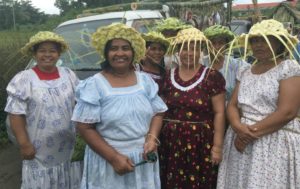
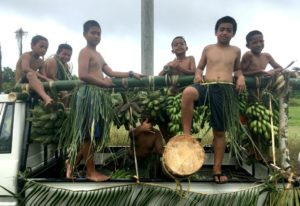
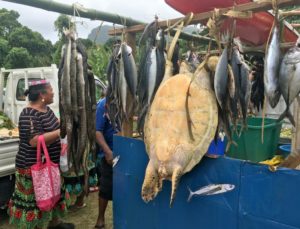
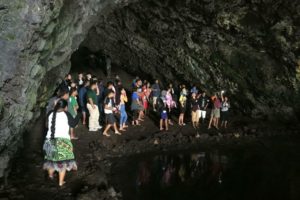
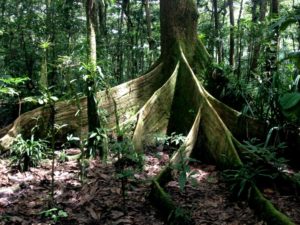
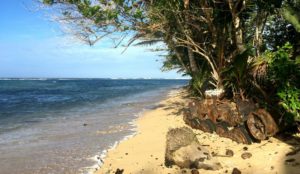
Some places here(as seen on tv) appear desolate. Locally, things appear normal if one does not look closely. The homeless have been put somewhere and have disappeared from our streets. I live on a small (inactive) farm so I’m on an “island” of sorts. I taught in West Berlin, when it was an “island” in East Germany and on Guam. One has to stay busy and involved on any island (or anywhere). You may be concerned, but there is enough there for you to be ok.
All of us must make it through the next few months uninfected, but it is troubling that a few states with republican governors are making no effort at all to stop the spread of this virus. They may become reservoirs of reinfection unless they die off sufficiently to stop its spread. Meanwhile, we wait for a vaccine.
Best wishes to you, Nick. I was issued the same U. S. advisory. I chose to stay where I am in Mèrida, Mexico. Returning to the U.S. was not an attractive alternative, especially with nowhere there that I call home. It is eerily disconcerting to lose the ability to move freely throughout the world after four years of largely unfettered travel, but I will (must) adapt. Perhaps the days of freely flitting about from one place to another are over. We shall see. I was fortunate to land in a good spot to wait out the crisis, and it appears you were, too. Good luck to us all.
Hi Nick ~
So wonderful to get your update. I’d have send the same email response to the Embassy! You always uplift and edify….didn’t know about, Newton or Lear being written in those extreme time eras. Will share that with my good friend who played Lear in his last collaboration with James Dunn. His first one with James had been 45 years prior with a long string of great productions following. it will be fun to find out if my friend knew the time period circumstances in which Shakespeare wrote Lear.
The islanders will certainly enjoy having you amongst them, discovering your wide range of resourcefulness, along with your reciprocal interest in their lives and stories!
Have a beautiful moonlit whatever…. floats your boat for me,
Michele
PS Looking forward to the time you speak at the Mill Valley Library again, with a full room sharing your tales!
So, you’ve finally realized that our traveling days are over— “at least for a while”. It’s been a great roll for the past eighteen years for Trish and me—and the past ten have been enhanced by our friendship with you. As you know, we have shared many tales and friends, and have physically managed to meet up all over this tiny planet. Now you find yourself on one of the tiniest spots. We’re sure you’ll make the best out of it. The Kosraeans are fortunate.
We’ll stay tuned.
Hey Nick!
Remember how our mother always said, “Develop your inner resources, those things that no one can ever take away from you.” I have thought of her words all my life. She was right on!
I sure wish I was there enjoying your paradise. I am in Shengal city, Iraq, a partially destroyed town from ISIS and Coalition airstrikes. Shengal region is also an “island,” with all travel in and out restricted. Iraq has been shut down for nearly 2 weeks. We stay home and wait. No travel between governates (provinces) is allowed now.
Amy Beam
God bless you and keep you safe. I love reading about your travels. You’re not missing much here, so enjoy the island life.
Sounds like a great idea! I love reading about your adventures and this sounds like it was meant to be, of course. Crazy here in California and apparently pretty crazy in Australia as well. Many blessings
Thank you for your update and a reminder of life before the contagion.
We remain in a pandemic purgatory in Central WA state — people are hunkered down for who knows how long. A statewide stay-at-home order remains in effect except in essential industries, as spelled out by the state. The constabulary’s enforcement remains largely educational, at least at this point.
By happy (at least economic) circumstance for this area, one of the essential industries is agriculture. So activity continues in the nearby orchards, vineyards and fields in an ag-oriented valley . I’m guessing social distancing and hand-washing observance depends on the employer and employee. Let us hope they are doing it right.
Otherwise, the scene is very subdued. Traffic volumes have dropped precipitously. Pathways remain open, and folks on foot and bicycles generally give each other room. Yesterday I ran from the condo to the trailhead of a single-track trail system (Just over 10k round-trip) and totaled about 8k on the trails. Glad I ran there — the parking lot was full. The first 500 meters or so on the trails saw many families but also groups that appeared to be acquaintances. The population petered out once away from the trailhead. Good to see people getting out, but one hopes they aren’t being too careless.
The federal response remains muddled, with health officials saying one thing and elected ones walking it back. This state’s government and this county’s health department have done a much better job with sending a consistent message. Happily, the message hasn’t taken a partisan tone here in the way it has in D.C. — there is grousing but mainly on the margins.
We are living though history right now. Good to hear from you, and no surprise that you have found productive ways to wait out the viral storm. Take care.